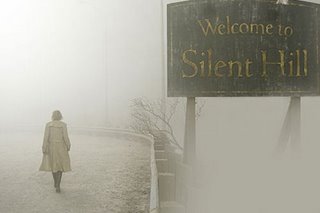What is it with big-budget horror and missing children? Every other film these days seems to chart a mothers struggle to retrieve her missing son or daughter. Whether it be Naomi Watts, Jennifer Connelly, Julianne Moore, Jodie Foster, or indeed, this time out, Radha Mitchell, caught in the large-scale game of hide and seek, the outcome hardly varies a great deal.
It's a similar kind of idea with Silent Hill, one of the increasing number of movies adapted from a computer game. Rose Da Silva (Radha Mitchell) travels to ghost town Silent Hill in search of a cure for daughter Sharon (Jodelle Ferland), who suffers from seizures and repeatedly mentions the place in her sleep. But when Rose crashes her car on the way, she awakes to find daughter Sharon nowhere to be seen, and so makes her way on foot into Silent Hill in search.
This small to big-screen adaptation is considerably more successful than that of previous attempts such as 'Resident Evil' and last year's 'Doom'. It is a credit to director Christophe Gans that Silent Hill never feels anything other than fresh, with a visual definition that almost effortlessly draws your attention. With the visceral nakedness of a soul stripped bar
 e, Silent Hill is a solitary vacuum of severity, that uses its astonishing atmosphereric harshness to great effect.
e, Silent Hill is a solitary vacuum of severity, that uses its astonishing atmosphereric harshness to great effect.When comparing the story of Silent Hill to that of its video game counterparts, it does have that familiar supernatural quest concept, but it's the boldness and vastness of its narrative puzzle that truly distinguishes it from many in the horror genre. Provoking questions with its intricate, somewhat unexpected plot turns, it does sacrifice a significant amount of clarity. Not having played the game, I'm unsure as to whether the story is less muddled whilst playing. Regardless of that, the film's sudden bursts of speed do tend to be more distracting than involving.
Radha Mitchell's attempts at manoeuvring her familiar desperate mother role are more than respectable, although she offers little more than the women before her. Her role is most certainly more confrontational and fantastical, but she gets much more help from her director than any of the other actresses received. The real stand-out of the film is Jodelle Ferland as the damaged daughter. Her shift in emotion and indeed personas is pitched clearly, with an immaculate precision that diverts the film's tone and focus with a single glance.
Silent Hill, while not the easiest of films to comprehend, works well simply because it's made well. Everything from the balance and tone, to the editing, is composed exactly as intended, and consequently, it's a brave, authentic and exciting piece of cinema.
As creepy as Silent Hill looks and feels, it doesn't have what Alexandre Aja's hills have - eyes. Yet another horror remake, this one from Wes Craven's 1977 film of the same name, The Hills Have Eyes is the story of a family on holiday in the West of America. When they're advised to take a short cut, their camper van goes off the road, leaving them stranded in deserted valleys, at the prey of cannibal nuclear victims.
Sitting alone (that's right, alone) in the cinema watching The Hills Have Eyes is a terrifying experience. In fact, it might just border on traumatic. Aja shoots the film as if we were still in the 70's, (and
 for a horror film, that's a compliment) with lots of traditional sequences and symphonies, giving the film an eeriness that, had it been modernised, probably would have been absent. Aja imprints his own slant on the film, while not fiddling too much with Craven's methodology.
for a horror film, that's a compliment) with lots of traditional sequences and symphonies, giving the film an eeriness that, had it been modernised, probably would have been absent. Aja imprints his own slant on the film, while not fiddling too much with Craven's methodology.It is perhaps the harsh reality within the story that makes The Hills Have Eyes particularly effective though. There is a scene in the middle of the film in which several characters die that I find difficult recounting as it repulsed and touched me to such a degree. While emotively convincing and rather brutal, the dynamic of the family is perhaps the most worrying aspect of the film. Horror films rarely take such time over their characters but when Hills attempts to, it does so in a shallow and ironically pedestrian fashion. The sense of political compromise between the republican father and democrat son-in-law being a particular indication that character studies should perhaps be left to films with a more profound purpose. Nevertheless, they are believeable as a unit.
Emilie De Ravin, of TV show 'Lost' fame, puts in a good performance, and has the more showier trauma scenes. It is Dan Byrd though, as son Bobby, that really shines, etching alone the sense of loss and desperation at the helplessness of the entire situation. The Hills Have Eyes is difficult to sit through, and for that it really must be sat through. It is a horror in every sense of the word, and is unashamedly heavy, weighing down everyone around it with an unrivalled onslaught. Relentless.
Silent Hill - Grade: B
The Hills Have Eyes - Grade: B-

No comments:
Post a Comment